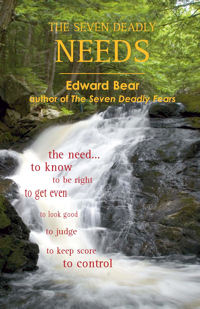The Seven Deadly NEEDS
The
Need... to know, to be right, to get
even,
to look good, to judge, to keep
score, to control
|
Whether you are in recovery or simply
looking to improve your life, Edward Bear's latest "Tyler tape" will show you how to overcome
your outwardly centered needs and concentrate on the inner work of healing and
growth.
The Seven Deadly Needs, the
sequel to Edward Bear's The Dark Night of Recovery, is written as a series of tape-recorded
sessions between a mentor, Tyler, and his somewhat resistant pupil, Edward Bear. Each session deals
with one of what Tyler calls the Seven Deadly Needs: the Need to Know, to Be Right, to Get Even, to
Look Good, to Judge, to Keep Score, and to Control. Because these needs are outwardly focused, they
force us to act in ways that are not true to ourselves, and often lead to addiction, isolation and
unhappiness. This book will guide readers around the potholes in life's road, and give
them direction toward a better life.
In form not unlike the Platonic
Dialogues, the seven chapters contend with the everyday issues that confine rather than expand our
experience of reality.
|

|
|
These obstacles keep us from an
awareness of how rich our lives can be. Through the course of the book, readers will learn how to
overcome these deadly needs, how to see the possibilities open to each of us, and how to view each
day as a wonderful opportunity for living. Although The Seven Deadly Needs is 12-Step oriented, the
principles and practices are universal and the tone is irreverent and charming.
Readers will be happy they
joined the teacher and his reluctant student as they journey through the mysterious graveyard of
the Seven Deadly Needs. And like Edward Bear, they will learn to just ignore the strange sounds and
the shadows that seem to move. There's usually very little danger. Usually.
|
|

